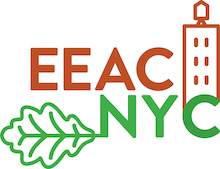The Teacher Environmental Education Preparation (TEEP) project was established in December of 1999 as a partnership among the Environmental Education Advisory Council (EEAC), the Wallerstein Collaborative for Urban Environmental Education at New York University and the Council on the Environment of New York City (now GrowNYC). EEAC still coordinates the current version of the project.
Between its founding and 2020 TEEP consisted of a network of university faculty, government agency representatives, environmental professionals and informal educators working together to bring about increased opportunities for environmental/sustainability education in preservice teacher education including classroom teachers seeking credits to complete their certification requirements.
During this period TEEP worked in partnership with such schools and organizations as SUNY Cortland, Brooklyn College, Pace University, the New York State Department of Environmental Conservation (DEC), the New York State Education Department (SED), the New York City Department of Environmental Protection, the New York State Chapter of the National Audubon Society and several other colleges and nonprofit organizations.
Between 2000 and 2020 TEEP held seven symposiums and four workshops throughout New York State to gain support for the inclusion of environmental education (EE) in teacher preparation programs. Symposia were conducted at Pace University in Westchester County, NYU and Teachers College in NYC, SUNY Cortland, at the State Education Department in Albany, SUNY Brockport in Rochester and the New York State Outdoor Education (NYSOEA) gathering during the North American Association of Environmental Education conference in Buffalo. Workshops were held at NYU and Teachers College from 2016-2019.
Some 235 college educators, government representatives, nonprofit professionals and informal educators attended these events. Over 30 colleges and universities participated. TEEP also gave presentations at conferences of faculty and administrators from colleges of education and met with elected officials and SED personnel.
The TEEP White Paper, “Teacher Preparation and Environmental Education: Meeting the Challenge in New York State”, published in 2005, was disseminated to a fairly wide audience and was printed in the newsletters of both EEAC and NYSOEA.
These efforts produced mixed results. Two colleges were motivated to try and start teacher preparation programs in EE and several deepened and enriched already existing programs. Some schools tried to infuse more EE into their programs by offering and/or requiring that their student teachers take Project Learning Tree, Project WILD, and/or Project WET. After the TEEP symposium in Rochester, DEC had offered these programs at no cost in a letter to colleges of education throughout the State.
In the early 2000’s SED agreed to accept a cognate, or series of two-three relevant courses (6-9 credits) in environmental science and/or environmental studies, as part of the certification package in science (Earth science, biology, chemistry, physics), social studies and common branches.
At a meeting of TEEP representatives with then State Senator Velmanette Montgomery and the Assistant Commissioner of Higher Education, the latter agreed to issue a letter from SED informing colleges about the environmental cognate option and encouraging them to develop a cognate and make it available to their candidates for teacher certification. Unfortunately the letter was very sparsely worded and did not really encourage schools of education to participate. One school started to develop an environmental cognate but never completed the task. It is unclear whether the cognate in EE is currently accepted by SED.
TEEP also worked with NYSOEA on the teacher preparation section of the New York State Environmental Literacy Plan that emerged from a statewide process organized by NYSOEA.
However despite the existence of excellent teacher preparation programs in EE in schools such as SUNY Cortland, NYU, Pace and others, and the teaching of environmental studies in many academic departments like English and political science, the majority of teacher training institutions in the State of New York do not adequately prepare their teaching candidates to teach environmental concepts.
As climate change emerged as the major Earth issue and became fundamental to any program of environmental studies, most of these institutions still did not adequately integrate climate change education into their teacher prep. programs.
In 2020 TEEP evolved into the Environmental Education Projects Forum (the Forum). The Forum brings together environmental educators from universities, government agencies and non-formal organizations at annual or biannual workshops and at specific project meetings, to generate ideas for creating, promoting and implementing projects that will expand environmental education in NYC and the region around the city.
TEEP is one project of the Forum. Currently the main TEEP focus is a syllabi bank of courses intended for the use of colleges of education to prepare prospective teachers to teach environmental/climate/sustainability in the classroom. The ten courses from four colleges (CCNY, NYU, Cornell and Bank Street) run the gamut from natural, life and environmental sciences for undergraduate students working to be elementary school teachers to human environmental impact for students getting a masters in secondary science education to climate solutions and environmental action for all teacher candidates.
While there have been more than 5,000 downloads of syllabi bank courses from colleges of education, cultural institutions and other schools all over the U.S., Canada and Europe, very few colleges of education from New York have downloaded any courses.
For the last three years a representative of EEAC/The Forum/TEEP has participated in the Climate and Resilience Education Task Force (CRETF), helping to craft a preservice education plank on the climate education platform and in the initial version of the climate change education legislation that has been considered in the appropriate committees of the New York State Legislature. A current version of the legislation does not specifically mention preservice but the CRETF committee is working to develop a preservice effort that will be compatible with the legislation.
Mike Zamm
EEAC

